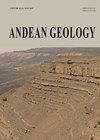Gold Deposits in Chile
IF 1.2
4区 地球科学
Q3 GEOLOGY
引用次数: 1
Abstract
A review of gold and gold bearing base metals deposits in Chile, indicate the existence of at least six different type of ore deposits, most largely formed during the Cenozoic with predominance in the Miocene. Mesozoic deposits are common but less relevant regarding their size and gold content. These hydrothermal ore deposits are genetically associated with subduction related Andean arc magmatism. Due to its relationship with episodic magmatism migrating eastward, there is a tendency for the deposits to be in distinct, north-south trending, belts with a progressive west to east decrease in mineralization age. After analysing 82 cases in total, main gold concentration can be assigned to high-sulfidation epithermal and porphyry type deposits. Low-sulfidation epithermal, IOCG and mesothermal type appears as less relevant. Gold bearing copper deposits constitute an important part of Chile’s total gold production. Both IOCG type but especially porphyry copper deposits are and will remain as a substantial source to supplement the future output of the gold in the country. The 82 deposits with their tonnage and grade studied, represent a total gold content of 11,662 t equivalent to 375 Moz, excluding past production for those exploited. A number of probable gold bearing base metals high tonnage deposits (IOCG and porphyry copper) do not include their gold content in public format, hence the number delivered could be estimated conservative. Methodical geochronological, ore types and zonation studies are required to better appreciate this metallogenic setting widening current understanding and future exploration results.智利金矿
对智利金矿和含金贱金属矿床的回顾表明,至少存在六种不同类型的矿床,大部分形成于新生代,中新世占主导地位。中生代矿床是常见的,但与它们的大小和含金量不太相关。这些热液矿床与俯冲相关的安第斯弧岩浆作用有关。由于其与幕式岩浆东移的关系,矿床呈明显的南北走向,成矿时代由西向东递进。通过对82个案例的分析,认为金矿主要富集于高硫化浅成热液型和斑岩型矿床。低硫化浅成热液类型、IOCG类型和中温类型的相关性较小。含金铜矿是智利黄金总产量的重要组成部分。无论是IOCG类型的铜矿,尤其是斑岩型铜矿,都是并将继续作为补充该国未来黄金产量的重要来源。根据所研究的82个矿床的吨位和品位,总含金量为11,662吨,相当于375亿盎司,不包括已开采矿床的过去产量。许多可能含金的基本金属高吨位矿床(IOCG和斑岩铜)没有公开其含金量,因此交付的数量可能是保守估计。需要有系统的地质年代学、矿石类型和分带研究,以更好地认识这一成矿环境,扩大目前的认识和未来的勘探成果。
本文章由计算机程序翻译,如有差异,请以英文原文为准。
求助全文
约1分钟内获得全文
求助全文
来源期刊

Andean Geology
地学-地质学
CiteScore
3.90
自引率
0.00%
发文量
17
审稿时长
>12 weeks
期刊介绍:
This journal publishes original and review articles on geology and related sciences, in Spanish or English, in three issues a year (January, May and September). Articles or notes on major topics of broad interest in Earth Sciences dealing with the geology of South and Central America and Antarctica, and particularly of the Andes, are welcomed.
The journal is interested in publishing thematic sets of papers and accepts articles dealing with systematic Paleontology only if their main focus is the chronostratigraphical, paleoecological and/or paleogeographical importance of the taxa described therein.
 求助内容:
求助内容: 应助结果提醒方式:
应助结果提醒方式:


